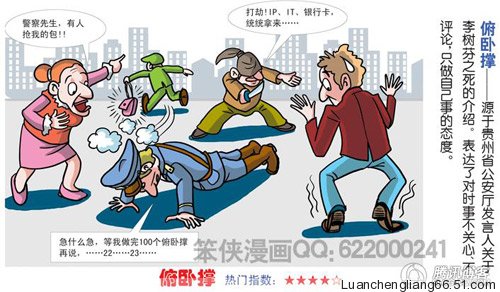Push-ups
来自China Digital Space
俯臥撐 (fǔ wò chēng): push-ups
This word took on new meaning when police claimed the son of a government official did not rape a girl, alleging instead that he was doing “push-ups.” Backlash against this suspected cover-up resulted in the Weng’an incident.
The son of the government official was alleged to have raped and killed a 16 year old girl. In an attempt to quell the outcry, police claimed that the boy did not kill the girl. They stated that the girl and boy had been arguing along the bank of a river. After the couple calmed down, the boy began to do some push-ups next to the girl. The police claimed that after he had done three push-ups he heard her say, “I’m going,” after which she jumped into the river and drowned herself.
Few believed the police account, and a riot ensued involving tens of thousands of people. After the event, the phrase, “I was doing push-ups,” became a coded critique of any unpersuasive police excuse. As the phrase has spread it has shed much of its political connotation and in many usages has no one definition, sometimes meaning “I have nothing to do with the matter.” At other times it can refer to a nonsensical cause of death.
Other official police accounts of individuals' deaths have attracted similar scorn. For example, death from drinking boiled water has a similar origin, as does death by hide and seek.





